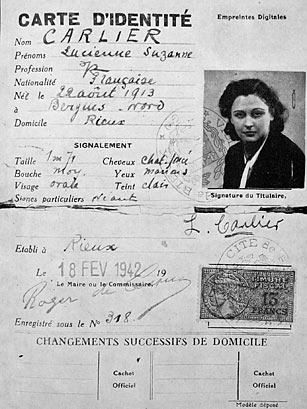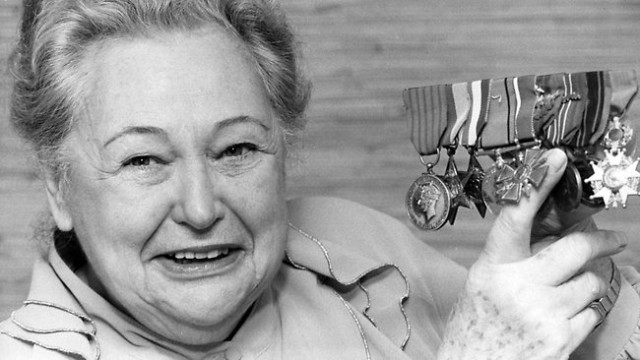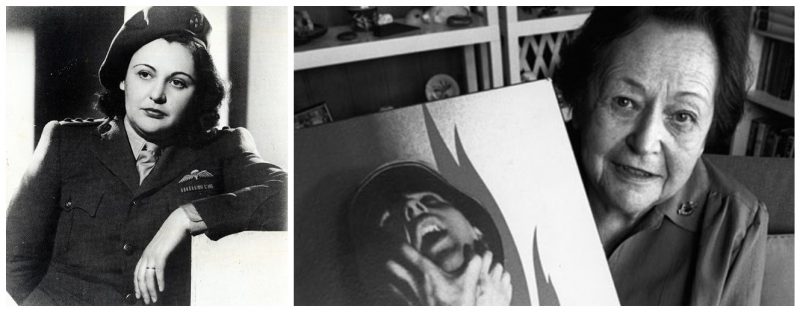The books and moments of history are filled with memorable names, courageous figures, and moments of sheer ingenuity. Yet not all names are as well recognized as they perhaps should be – and this is the case with Nancy Wake.
Did you know that a well-to-do woman with a wealthy husband living a fantastic life in Europe changed course entirely and became a secret agent as World War II exploded around her? That is Nancy Wake’s story: a woman who saw evil arising in Germany, and who decided that she would act instead of cowering in fear.
Over the course of the war, Wake earned herself the title of the Gestapo’s most wanted person as well as the leader of Maquis in France who worked to bring down the Germans occupying their nation. Despite the immense danger at every turn, Wake furthered the Allied Forces’ efforts as a secret agent, changing the tide of the war with little recognition.
Life Before the War
Of course, Nancy Wake didn’t begin her life as a secret agent throughout Europe – in fact, the years before World War II exploded the international community into chaos, she was living in Australia. Born on August 30, 1912, Wake spent her earliest years growing up in Roseneath, Wellington, New Zealand with her parents and five older siblings. At age two, the Wake family left New Zealand and settled into a new home in North Sydney, Australia. Soon after, Wake’s father abandoned the family, leaving her distraught mother to care for all six children alone. The Wake family struggled to survive, and Nancy herself was left with a sour distaste for her father for the rest of her life.
While a student at North Sydney Household Arts School, Wake decided to take her future into her own hands and ran away from home at age 16. She enrolled in nursing school, planning to work and make her own way through life. Yet Wake didn’t remain a nurse for long.
With just £200 inherited from her aunt, Wake decided to change paths entirely and head to New York. Shortly after arriving, she left and began working towards an entirely different career in London: journalism. Wake taught herself all she needed to take London by storm, and she took a journalist position in Paris. From there, Wake continued to rise through the ranks and became a European correspondent for Hearst newspapers, a position that allowed her to travel from country to country in search of news.
Yet as Wake worked and enjoyed all that Europe’s cities had to offer, something sinister was growing around her. Throughout the 1930s, Wake reported and observed while Adolf Hitler began to rise to power. She saw the Nazi Party preach its anti-Semitic propaganda, the German people flock to the principles and power of Nazism, and the government allowed Hitler increasing powers.
Horrors began unfolding early in Hitler’s reign; Wake witnessed roving Nazi gangs strolling along the streets of Vienna and mercilessly beating Jewish citizens, and saw Nazi party members chain Jewish men and women to wheels, whipping them as the wheels rolled through the city square.
Despite the growing tension throughout Europe and her expanding career, Wake did find time to fall in love. In 1937, she met the love of her life, a French industrialist named Henri Edmond Fiocca. Two years later, the two were married; they settled down together in Marseilles, living a life among the city’s wealthy as they traveled, hosted lavish dinner parties, and enjoyed the finest things France offered. Yet their honeymoon ended as German tanks and troops invaded their home country just six months after Wake and Fiocca married, setting in motion the turbulent years that were quick to come.
Wake Chooses the Resistance
As the 1940’s approached, the scenes of random and unnecessary torture Wake saw throughout Hitler’s rise to power haunted her. She was determined to find a way to work against the Nazis and help bring Hitler’s era to an end – and the French Resistance provided the perfect first opportunity for Wake to make a difference. When Germany took control of France, Wake decided it was time to act, and she joined the newly formed resistance movement. Her first role in the organization was courier; Wake spent years smuggling food and secret messages to underground groups working to oppose the Nazis throughout Southern France.
She also used her husband’s status as a respected and wealthy businessman to aid Resistance efforts. While the Nazis restricted travel for most French citizens, Wake’s marriage gave her the freedom to come and go as she pleased. Wake turned that freedom into opportunity and purchased an ambulance, which she used to safely shuttle fleeing refugees out of France.

From 1940 to 1943, Wake worked tirelessly to help people escape the increasingly dangerous control of the Nazi Party. When her ambulance shuttle trips came to an end, she devised a new plan: Wake managed to secure fake legal papers that allowed her to work in German-occupied Vichy, where she escorted more than 1,000 escaped prisoners of war and downed Allied aircrews to safety in Spain.
Of course, these missions weren’t easy feats by any means. Wake’s life was at risk with every escape, every Allied enemy she helped – and the Gestapo wasn’t blind to her work. Wake’s association with the French Resistance quickly made her a suspect, and her every move was watched. From tapping her phone to opening her mail, the Gestapo went to great lengths to catch Wake and imprison her.
Wake, in response, became a master of fake identities. She went by many different fake names, confusing and frustrating the Gestapo so greatly that she earned the nickname “White Mouse.” By 1943, Wake was the Gestapo’s number one most wanted person. Anyone who captured or killed Wake would earn five million francs.
It was then that Wake knew she needed to flee France. With the Gestapo tracking her every move and an incredibly high price on her head, Wake’s husband told his beloved wife to leave and never return. Escaping the razor-sharp eyes of the Germans wasn’t a simple task, though – it took Wake six tries to successfully cross the border of France. Once she survived, it was on to England, where she would be safe from the Gestapo and free to subvert Hitler’s Nazism as a true member of the Allied war effort.
Joining the Allied Espionage Efforts
Wake didn’t take a single moment to rest once safely in England. Instead, she went back to work, this time as an official member of the Allied Forces. She underwent training at a British Ministry of Defense camp in Scotland, where Wake learned crucial survival skills, how to kill silently, Allied codes, night parachuting, and how to operate everything from grenades and plastic explosives to rifles and pistols.
Wake then joined the French Section of the British Special Operations Executive (SOE), a team of 469 Allied individuals working with local resistance groups throughout Europe to sabotage the Germans in occupied territories. She was one of just 39 women in the organization. Yet to ensure total secrecy, the SOE officially assigned Wake and her compatriots to the First Aid Nursing Yeomanry – the group’s true objectives were kept closely guarded until the end of the war.
Together, Wake and her fellow SOE operatives tackled dangerous missions. One of their first missions – and most memorable – took place on April 29, 1944. Together, Wake and Major John Farmer were sent on a mission to gather the Maquis, establish ammunition and arms caches that would be dropped each night, and organize and prepare the French Resistance for D-Day. Under the cover of night, Wake and Farmer parachuted into Auvergne in central France. The drop wasn’t exactly executed as planned, as Wake’s parachute tangled in the branches of a tree and left her dangling above Farmer’s safe landing.
Despite the tricky landing, Wake and Farmer immediately got to work with the French Resistance. A mere 4,000 Maquis were organized against 22,000 Nazi troops, leaving Wake and Farmer facing an uphill battle if they were to complete their mission.
Wake charged ahead, recruiting 3,000 more members to join the Maquis ranks while collecting weapons and training new recruits in guerrilla warfare. Under Wake’s leadership, the Maquis successfully attacked German troops in multiple locations. However, their efforts weren’t without repercussions; in response to the Maquis’ actions, the Nazis raided various Resistance buildings and destroyed crucial orders, codes, and supplies.
Wake wasn’t one to allow the enemy to win – she responded to one raid in particular by riding a bicycle 500 kilometers through German security checkpoints in order to replace all that was lost. Without this 71 hours-long daring ride, Wake and the Resistance would be without weapons, without supply drops, and without any hope.
At no point during her mission to train and coordinate Maquis did Wake give up. Though it seemed an almost impossible and insurmountable task, Wake persevered through everything: sleepless weeks and months, constant traveling to train new Maquis groups, hiding in forests and brush, motivating the fighters of the Resistance, and endless planning.
Along with her challenging leadership, responsibilities came combating the Nazis themselves, as the German troops waited at every turn. Wake entered numerous violent battles with the enemy, as they worked to end the Resistance’s work by taking hostages, executing opponents, burning buildings and encampments, and retaliating with surprise attacks. Yet Wake and the Maqui forces were unrelenting, and the Nazis knew it – they referred to Wake’s strong hold on Auvergne “the Fortress of France.” No other Resistance effort was so greatly despised by and impenetrable for the Germans.
Victory Approaches
In order to maintain control over central France, the Nazis knew Wake had to be eliminated. With her leading Resistance efforts in the region, it would be impossible. Tthe SS developed a new plan to obliterate both Wake and those fighting alongside her. The Germans built up their army and their weaponry, and in June 1944 they surrounded Wake’s stronghold with 22,000 SS troops, artillery, mortars, and mobile guns – they were ready to unleash a hellish attack on the mere 7,000 Maquis. The battle, however, didn’t turn out as the SS expected. Wake and the Maquis fought viciously, and when the dust settled 1,400 German soldiers were dead. Only 100 Maquis met the same fate. Victory was on the horizon, and the Nazis saw just how powerful Wake’s Resistance could be.
Wake became even more emboldened by the successful standoff between the Maquis and the Nazis. She fought against the Germans even more visibly, leading a raid on the Gestapo headquarters and even killing a Nazi SS officer with her bare hands during a raid on a German weapons factory. She wielded a gun, shooting her way out of potentially deadly situations and executing Nazi spies. There was truly no stopping Wake’s blazing path to freedom and success – and, with her help, the Allied troops were facing victory in France.

On June 6, 1944, a date now known as D-Day, the Allied forces finally removed the German army from France. About two months later, on August 25, Paris was liberated and freed from German control. Wake, the Maquis and her Allied compatriots all celebrated this historic moment in Vichy. Over the course of the next year, the Allied forces brought Germany and the Nazi Party to the ground.
Though Wake survived the war, not all who were recruited alongside her achieved such success – some were killed, some were captured and imprisoned, and some were taken to concentration camps. Out of the 39 women whom Wake joined in the SOE French Section, twelve didn’t see the war’s end; 375 of the total 469 operatives survived to celebrate Nazi defeat.
Celebrating Post-War Life
Though the war drew to a close not long after the Allied Forces liberated France, Wake didn’t give up her wartime efforts to return to a quiet civilian life. Instead, the incredible secret agent stayed with the SOE, leaving France to work within the Intelligence Department at the British Air Ministry. She continued her work in England until 1960, when she married John Forward, a former prisoner of war. When the couple began their new life together, Wake and Forward moved to Australia – after many long years, Wake returned to the nation of her childhood.
In the years after World War II, Wake was heralded and honored by various Allied nations: she received the George Medal in England for leadership and bravery under fire; the Resistance Medal, Officier of the Legion d’Honneur, and Croix de Guerre as gestures of thanks from France; and the Medal of Freedom from the United States. Despite these international accolades, two nations were slower to honor Wake’s heroism and bravery.
Though numerous nominations were made by various citizens and organizations, the Australian and New Zealand governments didn’t approve any awards or medals in recognition of Wake. However, 60 years after Wake celebrated France’s liberation, Australia finally awarded her the Companion of the Order of Australia. Two years later, Wake was commended by New Zealand when they honored her with the country’s highest level of recognition: the NZ Returned Services Association’s RSA Badge in Gold.

The celebrations of Wake’s incredible story and historic feats didn’t end with official awards, medals, or honorary titles. Her wartime work as a secret Allied agent inspired countless documentaries, television and film dramas, and other representations in the media. Wake herself shared her life’s work with the public when she took part in the film Nancy Wake – Code Name: The White Mouse, which told her story through interviews, story retellings, and old film footage. Ever the courageous portrait of strength, humility, and fiery personality, Wake welcomed the opportunity to speak about all she’d seen before, during, and after World War II.
In 2011, the world lost a wartime hero when Nancy Wake passed away in a retirement home on August 7. For years, Wake had expressed the wish that her ashes would be scattered throughout central France, covering the mountains and landscape over which she fought alongside the Resistance. Certainly, Wake will always be remembered for her heroism, her courage, her determination to defeat the evils of Nazi Germany.
Few of those named as the Gestapo’s most wanted would survive, as Wake had. Though her enemies tried time and time again to eliminate her, they never got the better of Nancy Wake. Instead, she helped to bring the Germans down with daring sabotage, strong leadership, and an iron will.
